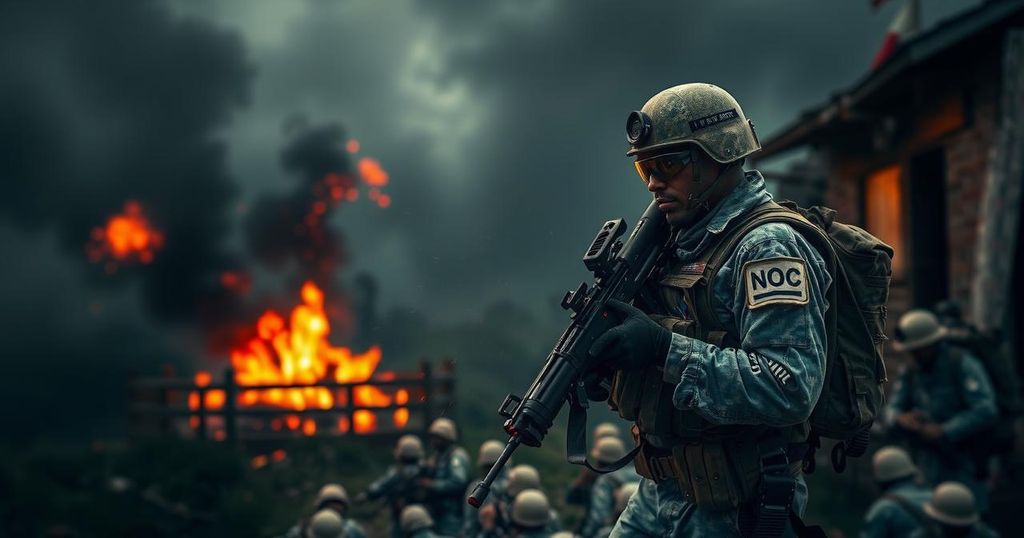HRW Report Exposes Civilian Atrocities by Rwandan Forces and M23 in DRC
Human Rights Watch reported significant civilian atrocities in the DRC amid conflicts involving Rwandan forces and the M23 rebel group. The report highlights increasing violence, unlawful detentions, and alarming rates of sexual violence affecting local populations, especially in displacement camps. HRW calls for investigations and humanitarian support for victims, emphasizing the need for adherence to international humanitarian law and protective measures.
Human Rights Watch (HRW) has issued a report detailing severe civilian atrocities in the eastern Democratic Republic of the Congo (DRC), amid ongoing conflicts involving Rwandan military forces and the M23 rebel group. As these forces advance towards the town of Sake, local populations, including over half a million internally displaced persons, face escalating threats of violence and humanitarian emergencies. The M23, a Tutsi-led militia supported by Rwanda, has been implicated in numerous acts of brutality against civilians, amongst them indiscriminate assaults, sexual violence, and the forcible recruitment of minors into combat. The precarious conditions in North Kivu, particularly in displacement camps near Goma, have further intensified, with explosions and violence becoming distressingly common. A stark instance of this violence occurred in early April when rockets fired by Rwandan military forces and M23 targeted the Shabindu-Kashaka displacement site, resulting in the death of a young victim. Subsequent rocket attacks on May 3 in the Lac Vert and Mugunga neighborhoods claimed the lives of at least 17 civilians, predominantly children. The alarming rate of humanitarian crises has also been evident in the Kanyaruchinya camp, where reports indicate unlawful detainees held by Wazalendo fighters are subjected to extortion and violence. Survivors recount harrowing experiences, frequently involving military personnel. The pervasive instances of sexual violence—including claims that assailants often wear military uniforms—have reached alarming levels within the camps, with reported occurrences ranging from 50 to 100 cases weekly. Such crimes are categorized as war crimes under international humanitarian law, specifically the Fourth Geneva Convention. The noted unlawful detentions and extortion activities may also equate to war crimes in accordance with the Rome Statute of the International Criminal Court. In response to these violations, HRW has called upon both Congolese and Rwandan authorities to conduct thorough and impartial investigations into alleged war crimes, particularly those pertaining to sexual violence, under the principles of command responsibility. Additionally, HRW advocates for enhanced humanitarian assistance to support affected civilians, ensuring comprehensive legal, social, and medical aid for sexual violence survivors. To fortify civilian protection, HRW further urges both nations to endorse the 2022 Political Declaration aimed at mitigating the humanitarian repercussions of explosive weapons in populated areas. Lastly, the organization highlights the essential role of the United Nations, the European Union, and other global entities in monitoring military support to prevent further human rights abuses.
The ongoing conflict in the eastern DRC, particularly involving Rwandan forces and the M23 rebel group, has created dire humanitarian conditions for civilians. The M23, which resurged in 2021, has been linked to numerous atrocities, raising concerns about the impact of armed groups on local populations. The situation in North Kivu is particularly critical, as displacement camps are overwhelmed with violence and insecurity, leading to significant human rights violations. International awareness and intervention are imperative to address these escalating crises.
In conclusion, the report by Human Rights Watch underscores the urgent need for accountability in the DRC, especially regarding the severe impact of Rwandan forces and the M23 on civilians. The calls for investigations into war crimes and the provision of humanitarian assistance reflect a critical approach to alleviating the suffering endured by those affected. The complex dynamics within the region necessitate a coordinated global response to uphold human rights and foster peace.
Original Source: www.jurist.org




Post Comment